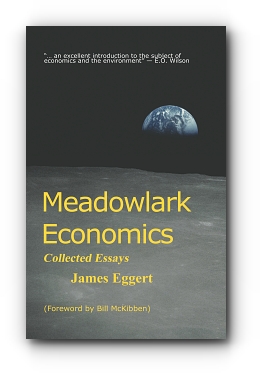| ||||||||||||||||
| Category: Environment |
(requires Adobe Reader)
|
| About the Book | |
|
Foreword By Bill This is an unusual and valuable book in many respects. Its author, of course, is an economist — but not one devoted to the prevailing theology of his profession. Economists mostly work with the dedication of beavers or bees toward the great goals of More. Growth, expansion, and acceleration are the sacred words of their creed. And they have been enormously successful; their faith has spread around the world, crowding out all other creeds. And yet there is always something rather, well, dismal about the field. This comes, I think, from its disciples’ firm determination to wall off certain questions. For instance, “What makes for happiness?” Or “How do I figure out what I want from life?” They can answer these only by pointing to our consumer behavior. We must want what we buy. But they must sense the tautological absurdity of that line of argument. Now comes James Eggert, one of a small school of economists who has begun to think outside the box. And it is curious that he soon delves deeply into a concept long used by his tribe: value. In his essay “Meadowlark Economics,” Eggert inscribes it — marvelously — with real meaning, instead of the stale and transactional definition to be found in the front of the Econ textbooks. The meadowlark’s “song is pleasing, his color and swoop-of-flight enchanting.” Suddenly we are using good old nouns and adjectives, the sweet and solid Anglo-Saxon words instead of the ponderous Latinate syllables of the professional journal. These things are a form of wealth and are valuable, he insists. And if you assign them a value in your heart, then you are in a position to begin to assess both the positives and the negatives of economic growth. The so-called “efficiency,” for instance, of the modern farm, which leaves no room for the meadowlarks to nest and fledge their young — is but one of many examples… Eggert’s book will be of great use to all who read it. But it would be especially helpful — though subversive — to give it to anyone you know who is an economist. It will help them see, among other things, that grasping onto the conventional economic orthodoxy not only shows a certain blindness but can also, unfortunately, turn out to be tragic. From Kirkus Reviews This collection of thoughtful essays weaves together economic and ecological issues. While Eggert is an economist by trade, he is struck by the relationship between economics and ecology. “I believe these two households are becoming more interdependent,” he writes, “and their futures more and more intimately linked.” Indeed, each of the 21 elegantly written essays in this revised collection, has a strong eco-conscious component. The unusual title is derived from the author’s concern over the Midwest’s loss of meadowlarks; somewhat esoterically, he translates this occurrence into “meadowlark values,” suggesting that a “meadowlark economist” must “seriously try and incorporate an ecological consciousness and ecological values along with market thinking and market values.” Eggert’s essays are as soaring and aspirational as they are instructional and practical. For example, in “What’s Wrong with Capitalism?” he notes there is “a destructive quality in capitalism that often violates the ecological laws that can and should ensure life’s beauty, balance, health and long-term continuity.” … In perhaps his most novel essay,” Wal-Mart Pond,” Eggert cleverly combines ecology and economy by imagining a conversation with Henry Thoreau … His final essay, “Quartet,” is most worthy of contemplation: “what is our part in the ‘music’ of the cosmos, what is our role in the harmony of nature’s variations on a theme?” … At times poetic and philosophical, even as the author remains firmly planted on terra firma.
|
|
| Reviews | |
This collection of thoughtful essays weaves together economic and ecological issues. While James Eggert is an economist by trade, he is struck by the relationship between economics and ecology. When I was growing up on our dairy farm in Wisconsin 50 years ago, the song of the meadowlarks meant summer was here. The meadowlarks have all but disappeared now, and it is rare to hear them singing. This book is written in a readable and approachable style, and it speaks to my heart about the value of meadowlarks and what we can all do to be "meadowlark economists." … This book will help you further develop your philosophy on what it means to be sustainable.
|
|
| About the Author | |
 |
James Eggert is a writer and emeritus faculty member at the University of Wisconsin — Stout in Menomonie, Wisconsin, where he taught for thirty-three years. He studied economics at Lawrence University and later served in Kenya with the United States Peace Corps (1964 – 1966). He completed his master's at Michigan State University. |

